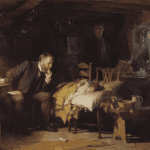It was a four day vacation at summer’s end. My wife, my two daughters and I headed to the Lake Superior sprayed coast of Duluth, Minnesota. It was a much needed escape from a summer of busy clinic schedules, nightly soccer games, Lego/basketball/volleyball camps and extended family vacations. This vacation would just be…us.
Duluth is a magical place for me. An eagerness sets in every time I drive those final miles downhill on the lazy north end of Interstate 35. As the road meanders this way and that, Lake Superior stretches like the ocean it pretends to be in all directions. Even the thin line of horizon is blurred as the sky condescends to kiss the enormous body of cold fresh water. Then, there is the fingerprint of man. Mountains of taconite, factories spewing threads of smoke from their stacks, hills peppered with small businesses and smaller homes and traffic skittering across impossibly long bridges leading from Duluth to Superior, Wisconsin. And then we arrive in our destination: Canal Park.
Canal Park is a charming hotel, shop and restaurant-bedecked finger of Duluth. It is a district that curls off the mainland, leads to the iconic Aerial Lift Bridge and opens beyond to the wind-battered peninsula of Park Point. It is on the shore side of Canal Park that one can walk for miles along the sturdily boarded Lakewalk and watch whitecapped waves, fearless swimmers (too cold for the generally sane) and overfed seagulls dueling over spilled popcorn. Hulking freighters emerge in the distance drawing nearer, nearer, nearer until a horn blasts three times imploring the Lift Bridge to rise and grant a night’s respite in the harbor beyond. Bikes and rollerblades, strollers and scooters make their way up and down the Lakewalk. People are simply drawn to the water. Enormous rocks populate the shore except along the elbow of the Lakewalk’s curve where impossibly smooth rocks, weathered by the sweet caress of water and time, make for perfect skippers.
It was truly idyllic.
And it was here that something profound dawned on me.
I want to stay here.
No. No, I don’t mean I want to leave my work and house, move to Duluth, get another job and house and start anew.
No.
I mean I want to stay here in this moment.
My daughters are young and full of wonder. They are climbing rocks and bringing me skippers. My wife is holding my hand and smiling at the girls. The wind is blowing the fresh lake air on us. In the early afternoon, it is cool enough to want to draw close to each other. And we have three more days ahead of us. Work is not here. School has not started. Anxiety, preoccupation, perseveration are nowhere to be found.
I want to stay in this moment.
But there’s no way, a demoralizing voice says to me.
You have to go back to work, it went on. You have to contend with the consistently overfilled inbox and call list and knocks on the door and taps on the shoulder. This person wondering, that person calling, this person running late, that person waiting. My own daily uncertainties. My own imperfections. You have to go back to schedules. Early morning struggles to wake overtired kiddos. Drop offs, pick ups, homework, housework, bills, dance, volleyball, conferences. You ought to feel guilty about this or that. Don’t forget to worry about that or this. Go. Go. Go.
But I want to stay in this moment.
This thought stayed with me – dominated me – through the whole vacation. As we skipped rocks and fed seagulls popcorn, as we overate at Betty’s Pies and overwalked on the trails at Tettegouche, as we toured Glensheen mansion or cruised on the Vista Fleet, I thought about it. I laughed at my daughters’ jokes and listened to my wife’s stories. I realized how much taller my girls had gotten and was reminded of how beautiful they are. I wondered at how one daughter likes to climb rocks and rent bikes while the other wants to engage in thoughtful conversation and consult my iPhone to keep track of the steps we have walked. I am reminded again why I fell in love with my wife.
I want to stay in this moment.
And then an assuring voice simply and starkly came to my mind.
Why can’t you?
What makes me stressed, frazzled and overtaxed in one environment and relaxed, introspective and enlightened in another is not simply the environment. Rather, it is how I react to the environment I am in. To be sure, there is no denying that life in a dank prison poses unavoidable stresses that life in an Italian seaside villa does not. But there are people who are able to find an extraordinary degree of peace in dire circumstances whereas there are others who find angst even in the most idyllic environs.
So…how does one carry the idylls of Duluth with him into the maelstrom of his every day life?
Here are the three lessons I learned in Duluth.
Lesson One: Reaction matters.
While we may have little control over what happens to us, we have enormous control over how we react to it. But our tendency is to react impulsively and emotionally (and often for the worst). Fr. Michael Casey, a Cistercian monk, described this tendency saying, “We do not know where these impulses come from; we are conscious of their urgency and strength but we are not fully aware of why they are pushing us in a particular direction and why the last thing they want us to do is slow down and take our time to examine their suggestions rationally. If we allow ourselves to be propelled into action by the movements of self-will, we will find ourselves wondering afterward why we did what we did and unable to provide any rational explanation…The monk freely chooses to follow Christ, not the impulses and tendencies of self-will.” Once we decide to react in a healthy, functional way (“I am not going to obsess on this”, “I am not going to worry about that”, “I am not going to feel guilty about this”, “I am going to take the kernel of wisdom from that criticism and throw the rest away”), it is extraordinary how liberating it can be. Try it. As a good friend has said to me, “You don’t get extra credit for worrying.” Reaction matters.
Lesson Two: Be intentional.
In Brideshead Revisited, Evelyn Waugh once brilliantly wrote, “Sometimes, I feel the past and the future pressing so hard on either side that there’s no room for the present at all.” To live in the sliver of time that is “the present” can seem nearly impossible. We are always planning (or worrying about) the future or reflecting (or stewing about) the past. But to miss the giggling daughter, the beautiful wife, the cool lake air or the majestic rock formation sitting in front of you is a damn waste. To miss those irreplaceable moments for hours long past or days yet to come is to live a distracted shell of an existence. In a few words, don’t lose Sunday to Monday. About the past, Christ Himself said, “No one who puts a hand to the plow and looks back is fit for service in the kingdom of God.” And about the future, He reminded, “Therefore do not worry about tomorrow, for tomorrow will worry about itself. Each day has enough trouble of its own.” Be in the moment. You will draw great riches from the experience. People will sense your engagement. Life will be fuller. Be intentional.
Lesson Three: What are you waiting for?
One year ago, my family went to Split Rock Lighthouse up the North Shore from Duluth. We were given a tour of this majestic lighthouse perched on the cliffs overlooking Lake Superior. Additionally, we were told of the history of its construction, life for its operators and shipwrecks averted. I bought a small book on the lighthouse and since then have found my mind wandering to that wonderful day and that intriguing story. I was intent on reading about Split Rock Lighthouse. And yet I haven’t. “Too busy,” I tell myself. “Maybe someday.” On this trip, I read an extraordinary essay by my good friend (and brilliant writer), Brad Zellar. It was about a week he spent on a freighter out of Duluth to a port in Michigan (click here and here to read). What struck me about this essay beyond its eloquence, wit and insight, was the fact that Brad had an interest and simply pursued it. And what he learned and how he grew in the process is extraordinary. He could have been a tepid soul who simply read about it, or worse, dismissed the idea out of hand as fanciful and irrelevant. But he didn’t. He seized the day. And as such, he took hold of oft-overlooked wonder and walked away more fully human. If not now, when? Just Do It and let the dead bury the dead. What are you waiting for?
When G.K. Chesterton finished his incomparable literary reflection on Charles Dickens, he put his finger on something I discovered in Duluth,
We have a long way to travel before we get back to what Dickens meant: and the passage is along a rambling English road, a twisting road such as Mr. Pickwick travelled. But this at least is part of what he meant; that comradeship and serious joy are not interludes in our travel; but that rather our travels are interludes in comradeship and joy, which through God shall endure for ever. The inn does not point to the road; the road points to the inn. And all roads point at last to an ultimate inn, where we shall meet Dickens and all his characters: and when we drink again it shall be from the great flagons in the tavern at the end of the world.
Our life is meant to be brimming with friendship and joy, and even the pesky tasks we have to finish can offer moments of joy if we react to them appropriately. Our life is aimed toward one thing: God. We are hungry for Truth, Goodness and Beauty. We are desperate for Joy, Solace and Peace. And so God is here. Nourishing us. Keeping us filled…if only we will come to the banquet.
You see, what I rediscovered is that God is not just the God of my Duluth moments – the moments in which I want to stay. He is the God of every moment.
Every moment.
How idyllic.
————————————–
Photo Credit: Me
















